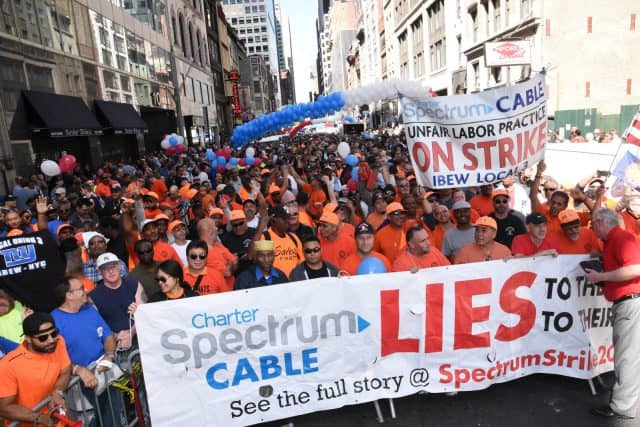
Spectrum workers on strike during the 2017 Labor Day parade in New York City. (Image courtesy: IBEW/Local 3)
New York City officials are giving Charter Communications 10 days to send $6 million in unpaid franchise and royalty fees or make a strong and credible case for why it shouldn’t pay, with likely litigation and the possible non-renewal of Spectrum’s contract to supply cable service on the line if the mayor isn’t satisfied.
In a letter addressed to Charter CEO Thomas Rutledge, New York Mayor Bill De Blasio accused the company of deliberately shorting the city’s share of revenue from Spectrum’s advertising sales, calculating the city’s cut based on the lower net amount collected after expenses, instead of on gross revenue, as the contract requires. The mayor also claims Charter is withholding royalty revenue from an ancillary business Charter partly owns.
“Charter Spectrum has proven time and time again that they’re unwilling to play by the rules,” the mayor told the Daily News. “This is money that can be reinvested in our communities instead of going into Charter’s coffers as they continue to hike rates for New Yorkers. [This latest] default is another thing we’ll take into consideration when their contract expires in 2020.”
Charter’s Endless Labor Problems Upset New York Officials
Charter is already in hot water with New York officials over its treatment of workers represented by the International Brotherhood of Electrical Workers (IBEW) Local 3, which have been on strike since March 2017. The highly skilled technicians were incensed when they learned hard-fought benefits were being clawed back by Charter, even as the company paid its CEO a record-breaking $98 million in compensation.

Mayor de Blasio
Over 1,800 middle class workers represented by IBEW Local 3 have suffered greatly over the past two years, according to labor reports. Many have had to cash in retirement savings, some have lost their cars or homes to foreclosure, others face mounting medical bills, in addition to family pressure at home. The union argues it is one of the last bastions to protect all middle-income earners from a race to the bottom mentality that is reducing wages and benefits. When a union worker is replaced with a less-skilled contractor, the pay and benefits Charter offers are significantly lower. Those technicians, regardless of their intentions, are also often poorly trained and risk alienating customers when repairs are incomplete or fail.
Many politicians in New York City have sided with the union strikers and have deplored the seemingly endless strike. Time Warner Cable, in contrast, had reasonably good relations with its unionized workforce. Prior to the merger, the biggest cable vs. labor union friction in the city was between the Communications Workers of America and Cablevision, which began after the CWA started organizing workers in Brooklyn and the Bronx in 2012.
With the Charter dispute approaching its second anniversary, the cable company has been spending subscriber dollars on a slick effort to convince its replacement workers to team up with the cable company to vote for decertification of IBEW Local 3 with the National Labor Relations Board.
Ironically, the same company that has dragged its feet settling the dispute has sent email to replacement workers claiming the union has done a lousy and ineffective job… of wearing down Charter.
In a Jan. 31 internal email obtained by In These Times, Charter Communications regional vice president of New York City operations, John Quigley, told workers, “In my opinion, Local 3 has not earned the right to represent you. Over the past several years they have misled their members, led them out on a strike without a clear plan, mishandled almost every aspect of the strike, made it very clear what they think of employees who are working with us today, and continue to make empty threats about harming our business. We hope that you vote ‘no’ and give us a chance to continue to make Charter a great place to work together.”
Race to the Bottom for Workers, Higher Rates for You
If Charter is successful in organizing replacement workers to side with the cable company and vote in larger numbers than the strikers, the current union representation will essentially end, along with the strike, handing total victory to Charter Communications. The cable company will likely impose its own terms on workers shortly afterwards. Critics claim that should be a familiar story for Spectrum subscribers.
“The company is basically union busting in New York City, and they’ve come in, raised rates on people and set their own terms because they hold a monopoly right now and there’s really no one to stop them from doing what they’re doing,” Troy Walcott, a striking worker, told In These Times.
With ongoing controversies with Charter on both the state and local levels, the company is likely to face increased scrutiny if the cable operator applies for a franchise renewal with the city next year, assuming state regulators do not move to enforce their own July 2018 decision to effectively kick Charter Communications out of New York State.
 JPMorgan “still believes in the potential of an eventual merger of Charter Communications with Altice USA, despite a cool-down in tie-up talk,” according to a short piece in Seeking Alpha.
JPMorgan “still believes in the potential of an eventual merger of Charter Communications with Altice USA, despite a cool-down in tie-up talk,” according to a short piece in Seeking Alpha.

 Subscribe
Subscribe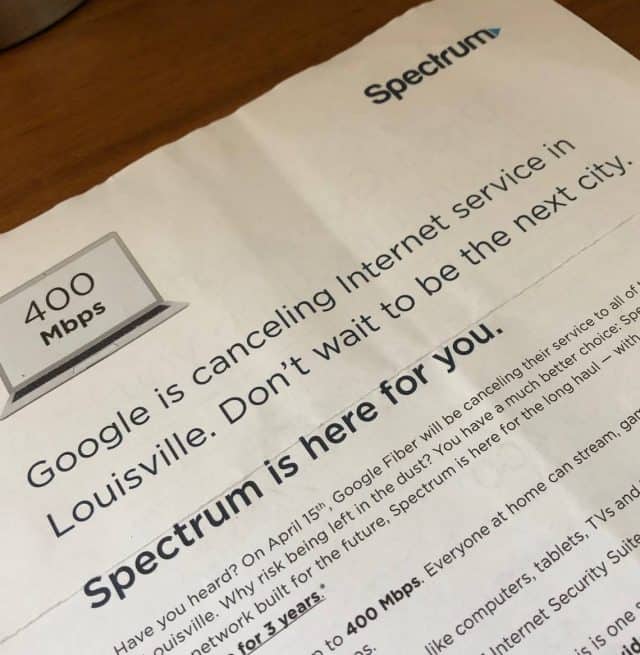


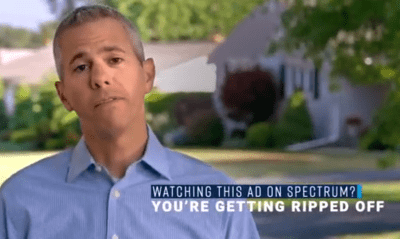
 Brindisi has bristled over the New York State Public Service Commission’s decision to repeatedly extend the deadline given to Charter to file an orderly exit plan winding down its cable operations in the state. The most recent extension was approved on Wednesday, now giving Charter Communications until April 5, 2019 to appeal the Commission’s decision and until May 9, 2019 to file its six-month exit plan.
Brindisi has bristled over the New York State Public Service Commission’s decision to repeatedly extend the deadline given to Charter to file an orderly exit plan winding down its cable operations in the state. The most recent extension was approved on Wednesday, now giving Charter Communications until April 5, 2019 to appeal the Commission’s decision and until May 9, 2019 to file its six-month exit plan.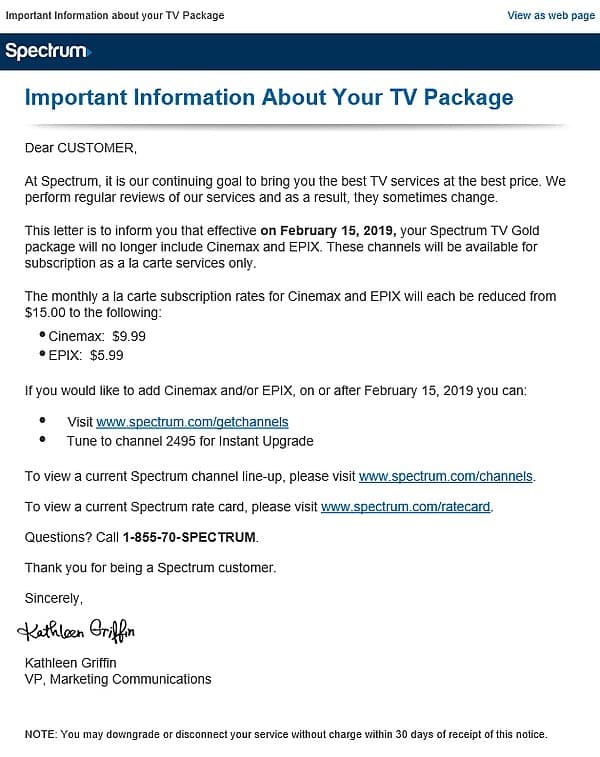 Spectrum cable television customers with Silver or Gold tiers will find two premium channels have disappeared from channel lineups, with no corresponding decrease in rates.
Spectrum cable television customers with Silver or Gold tiers will find two premium channels have disappeared from channel lineups, with no corresponding decrease in rates.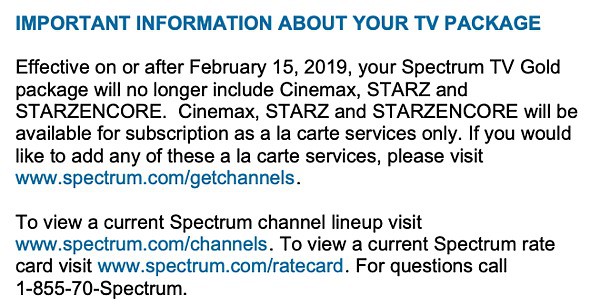
 Spectrum Silver (includes TV Select — add $20 a month)
Spectrum Silver (includes TV Select — add $20 a month) Spectrum Gold (includes TV Select and TV Silver — add $40 a month)
Spectrum Gold (includes TV Select and TV Silver — add $40 a month)